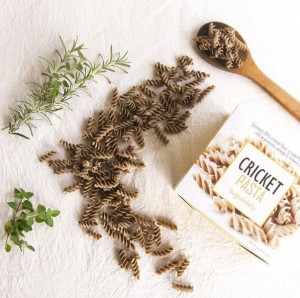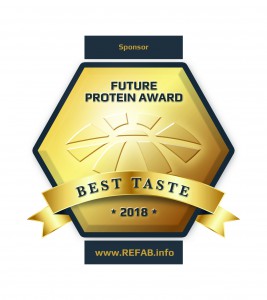In the following you will find an overview of the latest developments, that will be presented comprehensively and, with the “Future Protein Award”, awarded at the conference “Revolution in Food and Biomass Production (REFAB)” on October 1 and 2, 2018 in Cologne.
Deutsche Fassung: https://renewable-carbon.eu/news/wie-kann-der-zukuenftige-proteinbedarf-gedeckt-werden-insekten-solarproteine-und-kuenstliches-fleisch-werden-entscheidend-sein/
Matt Ball, senior media relations specialist of California-based The Good Food Institute, says: “The two most pressing issues facing the food industry today are: How will we feed almost 10 billion people by 2050, and what do we do about food production’s significant contribution to climate change? Agriculture causes more global warming than the entire transportation sector.” He sees the answers in a multitude of different technologies: “Plant-based and clean meat will be key to solving both these issues, as these approaches are much more efficient and sustainable than our current manner of producing meat.” What he means with clean meat is the production of meat based on cell cultures. Artificial meat that tastes and looks just like real meat but is produced in the lab without the need to rely on live animals. Two further options for innovative sources of alternative proteins are in the pipeline for a sustainable future protein production: Insects and so-called single cell proteins, which are solely produced by the use of sunlight and carbon dioxide.

A revolution of the old-known: Proteins from insects
Especially in recent years insects attracted attention as alternative food and protein source. Insects were used as human food in many cultures from the dawn of mankind and they can be found even today as part of traditional food in several regions of Asia, Africa, Australia and South America. However, especially in western culture, this kind of food is labelled as novel food and has to overcome several hurdles if it is to become part of the accepted food supply. Europeans usually see insects as pests, react with disgust and find it difficult to see them as valuable part of a meal. In order to introduce them as nutrition, creative solutions are necessary and specific fields of application must be found. Since the beginning of the year 2018, the new EU novel food directive offers some options to introduce insect products into the supermarkets, an opportunity for start-ups to to gain visibility. In Germany alone, there are several examples, such as insect-based protein snacks as sports food from companies like SWARM Protein in Cologne, pasta with mealworm flour from Plumentofoods in Pforzheim, available for customers at Metro markets, or burgers partly made of insects from the Bug Foundation from Osnabrück at REWE. These products were introduced in the last months and have started to spread as new and exotic products in the food market.
An extensive market to address is the usage of insects for feed as alternatives protein sources to feed from soy and especially to fishmeal for aquaculture. Companies like Ynsect in France, Hermetia in Brandenburg and AgriProtein in South Africa are working on insect cultivation at a larger scale to produce high-quality and protein-rich feed from mealworms, buffalo worms, black soldier flies and even termites for pigs, cattle, fish and pets. Additionally, they also aim to provide proteins and by-products like chitin to the industry for chemistry and biopolymers.
Proteins from the Sun and CO2: Solar Food
An even more advanced step is the production of so-called single cell proteins for food and feed. These are cells of cyanobacteria and other microorganisms produced by the use of carbon dioxide (CO2) and special breeding systems using modern biotechnology. The cells are cultivated in different ways and can be fed from sunlight to use photosynthesis or be sugar-based via fermentation processes. The final product consists of single cell proteins with a high protein content and tailor-made other ingredients like Omega 3 fatty acids and vitamins, that are essential for the requirements of various applications.
One system for the production of single cell proteins was developed by Dr. Juha-Pekka Pitkänen at the Finnish research centre VTT, who started a SME company this year with the perfect name for his products: Solarprotein. They will produce and market single cell proteins for food and feed applications in Helsinki. Asked about the taste of Solarprotein, Dr. Pitkänen answered: “You can eat it – but it does not have a taste by itself”; this makes it a perfect product for food since the taste can be adapted to the wishes of the customers. In case of Veramaris, a joint venture company of Evonik and DSM, the customers will be fish farmers –they concentrate on single cells with high concentrations of essential Omega 3 EPA & DHA fatty acids from natural marine algae to substitute fishmeal from marine fish, hoping to feed aquacultures in a more sustainable way.
Artificial meat and fish from the lab
Discussing all these alternative protein sources, one option remains that might become crucial in the future: meat itself, produced in a clean way by using cell cultures in a lab and later on in production sites. It will take several years to produce clean meat at commercial scales, but there are already several companies working on this innovation to make it available for customers in the next years. The high-tech start-up company Memphis Meats in California was backed by Gates Foundation and Richard Branson to produce the first hamburgers and meatballs made from artificially produced meat. In the Netherlands, the company Mosa Meat is also working on this topic and has presented their first meatballs. The company Supermeat from Israel started a first corporation with the German Wiesenhof Group for the development of artificial chicken meat. Finally, fish is also in focus, for example Finless Foods in California aims at producing artificial tuna fish fillet without the need of fishing.
Meet the experts and taste the new opportunities in Cologne
The nova-Institute in Cologne will bring together the experts in these, and other, areas of innovative food production at the new conference “Revolution in Food and Biomass Production (REFAB)” (www.refab.info) on the 1-2 October, 2018 in Cologne (Germany). The preliminary program is available online. Several speakers and exhibitors from leading companies and research institutes will present their newest developments and visions on new protein sources for food, feed and industry.

The “Future Protein Award” will be the highlight of the conference in the field of proteins. The award will be handed out by the German nova-Institute at the conference to the best companies presenting their products and concepts of future proteins derived from CO2, insects, algae, bacteria and cell-cultured meat at the accompanying exhibition. During the two-day conference, the expected 500 participants will be able to examine the concepts, taste the new proteins and vote for their favorite candidates – in the categories best taste and best concept. At the end of the conference the votes will be counted and the winners will be presented to the international press. Interested companies can still join the competition. More information here: https://renewable-carbon.eu/news/nova-institut-presents-the-future-protein-award/
Download press release as PDF file: 18-05-17 PR Alternative Proteins
Source
nova-Institut GmbH, press release, 2017-05-17.
Supplier
AgriProtein Holdings Ltd
Finless Foods
Hermetia GmbH
Mosa Meat
Rewe Group
SWARM Protein
Technical Research Centre of Finland (VTT)
The Good Food Institute
Veramaris
Virgin Group
Wiesenhof
Ynsect
Share
Renewable Carbon News – Daily Newsletter
Subscribe to our daily email newsletter – the world's leading newsletter on renewable materials and chemicals









